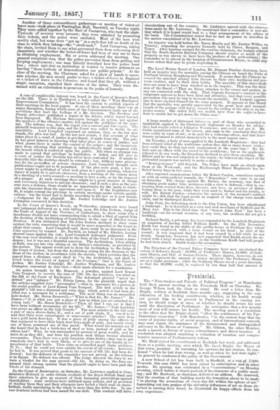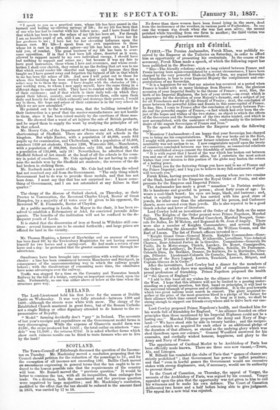Vrouintial.
The "Free-traders and Friends of Political Progress" at Manchester held their annual meeting in the Free-trade Hall on Thursday. Mr. George Wilson took the chair as usual. He read a letter from Mr. Bright, written at Rochdale three months ago, suggesting to the consideration of his leading constituents, whether, as his health would not permit him to be present in l'arliament in the coming session, he should resign at once, or whether lie should retain his seat until the dissolution of Parliament : he anticipates that a few months more of rest will restore his health. The meeting passed a resolution to the effect that Mr. Bright should "allow the continuance of his Parliamentary connexion" with Manchester, "in the earnest hope that tho cause of popular rights, of social progress, and of international concord, may soon regain the assistance of his disinterested and distinguished advocacy in the House of Commons." Mr. Gibson, the other Member, made a speech in favour of peace, retrenchment, and direct taxation. A resolution was adopted requiring a reduction of taxation and compres hensive measures of Parliamentary reform.
Mr. Miall visited his constituents at Rochdale last week, and addressed them at a public meeting, over which Mr. Jacob Bright, the Mayor of that town, presided. In narrating his services for last session, he confessed "when he had done wrong, as well as when -he had done right." In general he condemned the policy of the Government.
A new School of Art has boon built in Sheffield, at a costuf 7100/. Towards this sum 513001. has been raised by subscription and: in ether modes. Its opening was celebrated by a " conversasione" on Monday evening, which before it closed partook of the character of 41 public meeting; and Mr. Roebuck, as chairman, delivered an address. He observed, that the erection of that building marks the transition about to be made "in placing the avocations of every-day life within the sphere of art." Launching out into praises of the elevating influences of art on those absorbed in earning their bread, he illustrated its happy effects from his own experience. I speak to you as a practical man, whose life has been passed in the turmoil and boiling up-stirring springs of life ; for my life has been that of one who has had to combat with his fellow men ; and I have found that that which has been to me the solace of my life has been art. For though I am an humble pupil of art, still I am an adoring pupil. I love her for her goodness to me ; I love her for her elevating influence upon the human race. Mylife—I speak from my own experience to those whose lot is cast in a different sphere—my life has been one, as I have told you, of combat. The great business of my life has been to overcome opposition. If in that I had been left alone, deserted as it were, allowed to support myself by my own individual energy, I should have had nothing to support and solace me ; but because it was my fate to have good instructors, those whom I love and reverence, and whose recollection I shall ever cherish, they raised in me the feeling that art was to me that which would render life cheerful and happy ; and because they thus taught use I have passed away and forgotten the turmoil of life in that which to use has been the solace of life. And now I will point out to those for whom this building has been erected how that which has been to me a solace may be to them the same. I have fought with the obstacles of life ; and working men, to whom I now apply myself, have the same thing in a different shape to contend with. They have to combat with the difficulties of their existence ; and if that which is their daily toil—in which they spend their labour, anxiety., and energy—wearies them, calls upon them daily and hourly for that which exhausts and destroys their powers, I would say to them, the hope and solace of their existence is in the very school in which we are now assembled."
He pointed out to the working men, that the building intended for their instruction is a proof that the master-manufacturers are not hostile to them, since it has been raised mainly by the exertions of those masters. He showed that a want of art injures the sale of British products, and he urged them to supply the want by studying the principles of art in that school.
Mr. Henry Cole, of the Department of Science and Art, dilated on the shortcomings of Sheffield. There are above sixty art schools in the kingdom. But while Exeter, with a population of 40,000, sends 853 pupils up for examination, and Cheltenham, with a population of 35,000, numbers 1350 art students, Chester 1200, Worcester 500,—Manchester, with a population of 300,000, furnishes only 230, and Sheffield, with a population of 135,000, only 18! Nevertheless, he admitted that the Sheffield School of Art stands at the head of all the schools in the country in point of excellence. Mr. Cole apologized for not having in readiness the medals won by the Sheffield art students ; the reverse of the die had broken in striking them.
Mr. Roebuck made a point of this. Mr. Cole had told them the school had not received any aid from the Government. "The only thing which Government had to do was to provide those medals, and that has not been done. I must say that that has not surprised me : I know something of Government, and I am not astonished at any failure in that quarter."
The clergy of the diocese of Oxford elected, on Thursday, as their Proctor to Convocation, the Reverend Charles Lloyd, Rector of Great Hampden, by a majority of 41 votes over 31 given to his opponent, the Reverend W. R. Fremantle, Rector of Claydon.
At a public meeting in Leeds, the Mayor in the chair, it has been resolved to establish a Reformatory at Adel, for convicted juvenile delinquents. The benefits of the institution will not be confined to the delinquent youth of Leeds.
It is stated that the discoveries of iron at &end in Wiltshire still continue : several furnaces are to be erected forthwith ; and large prices are offered for land in the vicinity.
Mr. Thomas Hopkins, a farmer of Hawbridge and an assessor of taxes, has been fined 10/. by the Tewkesbury Magistrates for not having assessed himself for two horses and a spring-cart. He had made a return of one horse and a dog : he pretended that the greater omissions were through inadvertence.
Omnibuses have been brought into competition with a railway at Manchester: a lino has been commenced between Manchester and Stockport, in consequence of the unaccommodating way in which the railway people behave ; with the disadvantage of consuming more time, the omnibuses have 10 o m e advantages over the railway.
Traffic was stopped for a time on the Coventry and Nuneaton branch Railway by the fall of a bridge, carrying an important coach-road, upon the rails. Fortunately, no one was either above or below at the time when the structure gave way.














































 Previous page
Previous page